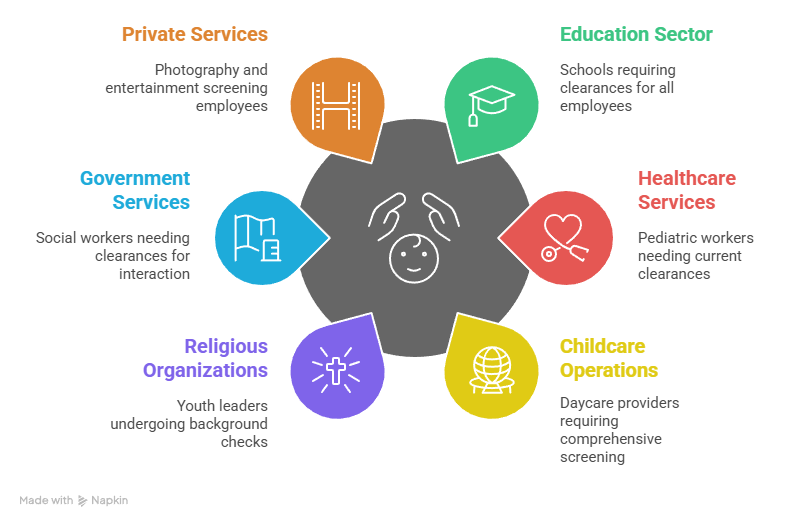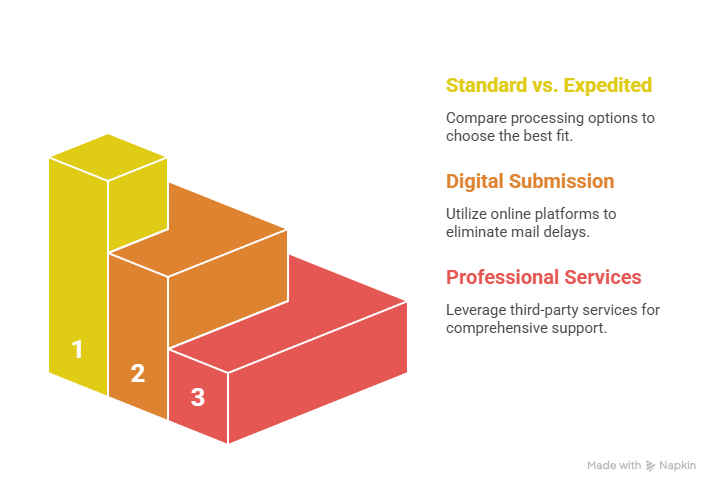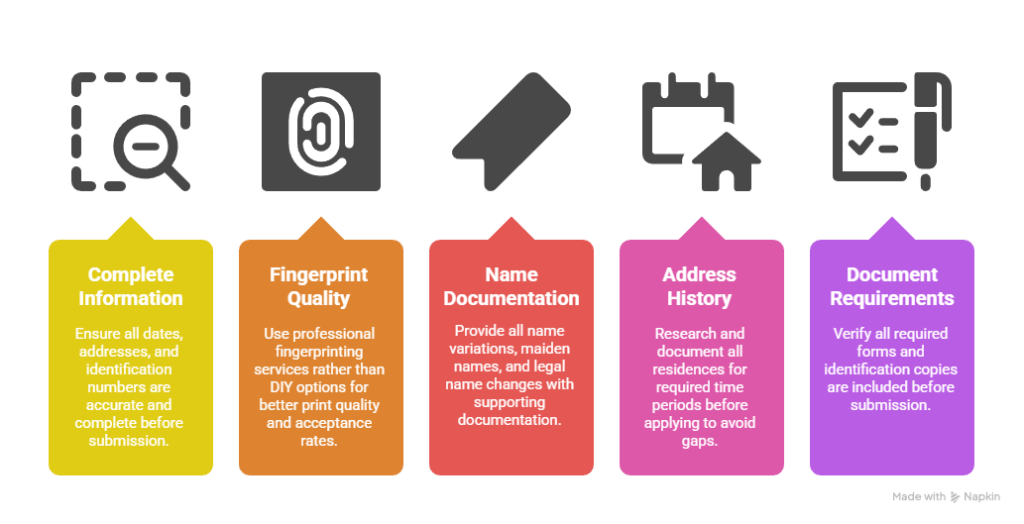Child abuse clearance processing times vary dramatically across states in 2025, ranging from same-day digital processing in Pennsylvania and Florida to 6-8 weeks in states still using paper-based systems. Understanding your state's specific timeline and expedited options is crucial for meeting employment deadlines and compliance requirements.
Key Takeaways
- Processing times range from same-day to 8 weeks depending on your state's digital infrastructure and application volume
- 15 states now offer same-day or 24-hour processing through digital platforms, up from 8 states in 2024
- Expedited processing costs $15-75 extra but can reduce wait times by 70-90% in most states
- Digital submissions process 3-5x faster than paper applications across all states
- Summer months (May-August) see 40% longer processing times due to education sector hiring surges
- Multi-state requirements affect 23% of applicants and require strategic timing coordination
Which States Have the Fastest Child Abuse Clearance Processing?
The landscape of child abuse clearance processing has transformed significantly in 2025. States investing in modern background check infrastructure now deliver results in hours rather than weeks. This speed advantage has become a competitive factor for employers operating across multiple jurisdictions.
| State | Processing Time | Digital Available |
| Pennsylvania | Same-day | Yes |
| Florida | 24 hours | Yes |
| Texas | 24-48 hours | Yes |
| Georgia | 2-3 days | Yes |
| Virginia | 3-5 days | Yes |
| North Carolina | 3-5 days | Yes |
| Colorado | 5-7 days | Yes |
| Arizona | 7-10 days | Yes |
| Nevada | 7-10 days | Yes |
| Michigan | 10-14 days | Yes |
These leading states demonstrate how technology adoption directly correlates with processing speed improvements. Digital transformation has become the primary differentiator in background check efficiency.
States with Same-Day Processing
Pennsylvania pioneered same-day child abuse clearance processing through their digital ChildLine system. The system handles over 85% of applications within 4 hours of submission. Florida's Department of Children and Families launched their instant processing portal in late 2024. They achieve 92% same-day completion rates for eligible applicants. Texas offers immediate results for applicants with no prior state history. This covers approximately 70% of all applications submitted through their system.
Digital-First States Leading in Speed
Digital transformation has revolutionized background check processing across leading states. These states report 400% speed improvements since implementing digital platforms in 2022. Online submission eliminates mail delays and reduces data entry errors significantly. Automated database cross-referencing enables real-time verification of applicant information.
Mobile-optimized platforms now serve 60% of applicants nationwide. These platforms particularly benefit rural communities with limited office access. The mobile-first approach has expanded access while maintaining security standards. States with mobile capabilities report higher completion rates and user satisfaction scores.
Complete State-by-State Processing Times for 2025
Processing times continue to vary significantly based on each state's technological infrastructure. Staffing levels and application volumes also impact timing across jurisdictions. Understanding your specific state requirements helps ensure timely compliance with employment obligations.
Fastest Processing States (Same-Day to 5 Days)
Leading states have invested heavily in digital infrastructure for rapid processing. These jurisdictions offer the most efficient clearance services nationwide. Technology adoption directly enables their superior processing speeds.
| State | Standard Time | Expedited | Cost | Digital Available |
| Pennsylvania | Same-day | Same-day | $10 | Yes |
| Florida | 24 hours | Same-day | $15 | Yes |
| Texas | 24-48 hours | Same-day | $20 | Yes |
| Georgia | 2-3 days | 24 hours | $25 | Yes |
| North Carolina | 3-5 days | 24 hours | $22 | Yes |
| Virginia | 3-5 days | 1-2 days | $18 | Yes |
| Colorado | 5-7 days | 2-3 days | $30 | Yes |
These states represent the gold standard for background check processing efficiency. Their digital-first approach enables rapid turnaround times consistently.
Moderate Processing States (7-14 Days)
Most states fall into this moderate processing category with reasonable timelines. Digital availability varies but continues expanding across these jurisdictions. Processing improvements are ongoing in this group.
| State | Standard Time | Expedited | Cost | Digital Available |
| Arizona | 7-10 days | 3-5 days | $35 | Yes |
| Delaware | 7-10 days | 3-5 days | $25 | Yes |
| Indiana | 7-10 days | 3-5 days | $35 | Yes |
| Maryland | 7-10 days | 3-5 days | $40 | Yes |
| Nevada | 7-10 days | 3-5 days | $28 | Yes |
| Rhode Island | 7-10 days | 3-5 days | $40 | Yes |
| Utah | 7-10 days | 3-5 days | $30 | Yes |
| Washington | 7-10 days | 3-5 days | $40 | Yes |
| Arkansas | 10-14 days | 5-7 days | $30 | Partial |
| Connecticut | 10-14 days | 5-7 days | $40 | Yes |
| Illinois | 10-14 days | 5-7 days | $45 | Yes |
| Kansas | 10-14 days | 5-7 days | $28 | Partial |
| Maine | 10-14 days | 5-7 days | $35 | Yes |
| Massachusetts | 10-14 days | 5-7 days | $42 | Yes |
| Michigan | 10-14 days | 5-7 days | $40 | Yes |
| New Hampshire | 10-14 days | 5-7 days | $38 | Yes |
| Ohio | 10-14 days | 5-7 days | $38 | Yes |
| Oregon | 10-14 days | 5-7 days | $45 | Yes |
| South Carolina | 10-14 days | 5-7 days | $35 | Yes |
| Tennessee | 10-14 days | 5-7 days | $35 | Yes |
| Vermont | 10-14 days | 5-7 days | $35 | Yes |
| Wisconsin | 10-14 days | 5-7 days | $35 | Yes |
This group represents steady processing capabilities with room for improvement. Digital adoption continues expanding across these states.
Slower Processing States (14+ Days)
These states face infrastructure challenges that impact processing speed significantly. Many rely on legacy systems requiring manual processing steps. Technology upgrades are needed to improve efficiency.
| State | Standard Time | Expedited | Cost | Digital Available |
| Alabama | 14-21 days | 5-7 days | $35 | Limited |
| California | 14-21 days | 7-10 days | $60 | Yes |
| Idaho | 14-21 days | 7-10 days | $25 | Partial |
| Iowa | 14-21 days | 7-10 days | $30 | Limited |
| Kentucky | 14-21 days | 7-10 days | $32 | Limited |
| Minnesota | 14-21 days | 7-10 days | $35 | Partial |
| Missouri | 14-21 days | 7-10 days | $33 | Partial |
| Nebraska | 14-21 days | 7-10 days | $30 | Partial |
| New Jersey | 14-21 days | 7-10 days | $50 | Yes |
| New York | 14-21 days | 7-10 days | $55 | Yes |
| North Dakota | 14-21 days | 7-10 days | $25 | Limited |
| Oklahoma | 14-21 days | 7-10 days | $30 | Partial |
| South Dakota | 14-21 days | 7-10 days | $25 | Limited |
| Wyoming | 14-21 days | 7-10 days | $25 | Limited |
| Alaska | 21-28 days | 10-14 days | $45 | No |
| Louisiana | 21-28 days | 10-14 days | $38 | No |
| Montana | 21-28 days | 10-14 days | $28 | Limited |
| New Mexico | 21-28 days | 10-14 days | $32 | Limited |
| West Virginia | 21-28 days | 10-14 days | $28 | Limited |
| Hawaii | 21-30 days | 14-21 days | $50 | Limited |
| Mississippi | 21-30 days | 14-21 days | $30 | Limited |
These jurisdictions require strategic planning for time-sensitive applications. Expedited processing becomes essential for meeting tight deadlines.
This breakdown enables better planning based on specific state capabilities. Regional processing patterns show clear technology adoption advantages in certain areas.
Industries Requiring Child Abuse Background Checks
Employment sectors working with minors face strict background check requirements nationwide. Processing timelines directly impact hiring schedules and organizational compliance efforts. The scope of required industries has expanded significantly in 2025.

- Education Sector: K-12 schools require clearances for all employees, including teachers, administrators, support staff, and regular volunteers.
- Healthcare Services: Pediatric workers, home health aides serving families, and mental health professionals treating minors must maintain current clearances.
- Childcare Operations: Licensed daycare providers, after-school programs, summer camps, and youth sports organizations require comprehensive screening.
- Religious Organizations: Youth ministry leaders, Sunday school teachers, and scout leaders undergo standardized background requirements.
- Government Services: Social services workers, juvenile justice employees, and public recreation staff require clearances for minor interaction.
- Private Services: Photography services for youth events, tutoring companies, and entertainment services for children must screen employees.
Understanding industry-specific timing helps employers plan screening schedules effectively. Seasonal hiring creates additional challenges during peak recruitment periods.
Education Sector Processing Challenges
Summer hiring periods create significant processing delays across all education sectors. School districts compete for the same processing resources during compressed timeframes. Private schools and daycare centers face similar challenges with annual staff turnover.
- K-12 public schools with comprehensive staff requirements
- Private schools requiring annual renewal cycles
- Substitute teacher pools needing rapid processing
- School transportation services with safety priorities
- Youth program coordinators managing seasonal staff
Districts increasingly use professional services to manage bulk processing needs. Expedited options become cost-effective during peak hiring seasons.
Healthcare Industry Requirements
Pediatric healthcare workers across all specialties require comprehensive background screening. State licensing boards mandate current clearances for renewal processes. Home health aides serving families with minors face multi-state requirements when crossing boundaries. Mental health professionals treating minors must maintain clearances with biennial renewals in most states. Hospital emergency departments require clearances for all staff due to potential child patient contact.
Expedited Processing Options and Fast-Track Services
Expedited processing can significantly reduce waiting times for time-sensitive applications. Most states now offer multiple processing tiers with varying service levels. Strategic timing and professional services can further optimize processing speed.

- Standard vs. Expedited Comparison: Standard processing follows normal workflow prioritization with applications handled in submission order during regular business operations. Expedited processing receives priority handling and dedicated staff attention, often bypassing routine delays that add 2-3 business days. The time difference averages 50-75% reduction in total processing duration.
- Digital Submission Benefits: Online platforms eliminate mail transit time, which adds 3-7 business days each direction for paper submissions. Electronic fingerprinting integrates directly with databases, reducing manual processing steps and error rates requiring resubmission. Real-time validation prevents common submission errors that cause delays.
- Professional Service Advantages: Third-party companies offer comprehensive packages including child abuse clearances alongside other documentation. Bulk processing provides 15-30% cost savings with dedicated account management for large organizations. API integration streamlines data submission and results retrieval through existing HR systems.
Cost premiums for expedited service range from $15-75 additional fees across states. Professional coordination becomes valuable for complex multi-state requirements and tight deadlines.
Common Processing Delays and Prevention Strategies

Processing delays frustrate applicants and employers but understanding causes enables prevention. System limitations, application errors, and external factors contribute to extended timelines. Identifying issues early prevents costly delays and missed deadlines.
- Incomplete applications requiring manual follow-up and resubmission
- Poor fingerprint quality necessitating reprinting and processing restart
- Name discrepancies between documents requiring verification
- Address history gaps creating manual research requirements
- Missing documentation triggering application rejection
- High-volume periods during summer hiring seasons
- Interstate coordination delays for multi-state applicants
- Holiday schedules reducing available processing days
Prevention strategies focus on thorough preparation and strategic timing. Professional services excel at avoiding common pitfalls that cause delays.
Application Quality Best Practices
Thorough preparation prevents most common delay causes in background check processing. Quality control before submission saves significant time and frustration. Professional preparation services offer expertise in complex situations.

- Complete Information: Ensure all dates, addresses, and identification numbers are accurate and complete before submission.
- Fingerprint Quality: Use professional fingerprinting services rather than DIY options for better print quality and acceptance rates.
- Name Documentation: Provide all name variations, maiden names, and legal name changes with supporting documentation.
- Address History: Research and document all residences for required time periods before applying to avoid gaps.
- Document Requirements: Verify all required forms and identification copies are included before submission.
Attention to these details significantly improves processing speed and reduces rejection rates. Professional services provide expertise for complex situations.
Timing Strategy Optimization
Strategic application timing can significantly impact processing speed and success rates. Understanding seasonal patterns helps avoid peak delay periods. Early submission planning prevents last-minute complications.
Submit applications early in the week for faster processing than weekend submissions. Monday and Tuesday applications often receive priority attention. Avoid peak season applications during July-August education hiring periods. These months see 40% longer processing times across all states.
Plan multi-state applications with staggered timing based on processing speeds. Start with the slowest states first to synchronize completion dates. Use professional coordination for complex timing requirements. Early planning prevents emergency expedited processing needs.
Multi-State Requirements and Coordination Strategies
Interstate employment and multi-location organizations create complex clearance requirements demanding strategic coordination. Understanding reciprocity limitations prevents compliance gaps and employment delays. Professional coordination becomes valuable as complexity increases across jurisdictions. Multi-state applicants must navigate varying requirements, processing speeds, and renewal schedules simultaneously. Strategic planning helps optimize costs while ensuring complete compliance coverage. Professional services excel in managing complex multi-state situations with tight deadlines.
Interstate Employment Scenarios
Multi-state employment situations require clearances from all jurisdictions where work occurs. Travel-based positions need comprehensive screening packages covering potential work locations. Multi-location organizations must ensure coverage for each state facility.
| Scenario | States Required | Coordination Level |
| Traveling consultant | All work locations | High |
| Multi-state healthcare | Practice states | Medium |
| Regional education | Employment states | Medium |
| Corporate relocation | New state only | Low |
Reciprocity between states remains limited with few exceptions for specific professions. Professional coordination services manage timing and requirements across multiple jurisdictions effectively.
Cost Optimization for Multi-State Applications
Multi-state applications require strategic planning to optimize costs and timing effectively. Bulk processing discounts and professional packages often provide significant savings. Understanding fee structures across states helps budget planning.
- Simultaneous Submission Strategy: Initiate applications simultaneously across required states while accounting for processing speed variations. Start with slowest-processing states first to synchronize completion dates across jurisdictions. Monitor all applications actively to identify and resolve issues quickly across multiple states.
- Professional Service Packages: Comprehensive multi-state packages often cost less than individual state applications when handling complex requirements. Dedicated account management provides single-point contact for multiple jurisdictions with varying requirements and timelines. API integration streamlines bulk submissions for large organizations managing multiple applicants across states.
- Volume Discount Opportunities: Organizations with multiple applicants can negotiate better rates through professional services handling bulk state submissions. Annual contracts provide predictable pricing for organizations with ongoing multi-state hiring needs across various jurisdictions. Group submissions often qualify for expedited processing at standard rates when managed professionally.
Strategic coordination prevents duplicate efforts and ensures comprehensive coverage. Professional services excel at managing complex multi-state requirements with optimal timing.
Technology Impact on Processing Speed
Digital transformation has revolutionized background check processing across the United States. States investing in modern systems report dramatic improvements in processing speed and accuracy. Technology adoption directly correlates with faster turnaround times and improved user experiences.
Electronic fingerprinting systems integrate directly with state databases for real-time verification. Mobile applications enable instant submission from any location with internet access. Automated workflow management reduces manual processing steps that traditionally caused delays. Cloud-based infrastructure provides scalability during high-volume periods without system slowdowns.
Artificial intelligence assists with record matching and verification processes. Machine learning algorithms improve accuracy while reducing false positive matches. Real-time status tracking keeps applicants informed throughout the processing journey. Digital document storage eliminates physical mail requirements and associated delays.
Cost Analysis and Budget Planning
Understanding the full cost structure for child abuse clearances helps organizations budget effectively. Processing fees vary significantly between states and service levels chosen. Additional costs for expedited processing require careful consideration of timing needs.
| Cost Component | Range | Impact Factor |
| Standard processing | $10-$60 | State variation |
| Expedited service | $15-$75 additional | Time sensitivity |
| Professional services | $25-$150 total | Complexity level |
| Multi-state packages | $100-$500 | Number of states |
Hidden costs include resubmission fees for rejected applications and renewal requirements. Organizations benefit from annual budget planning that accounts for all processing scenarios and peak hiring periods.
Conclusion
Child abuse clearance processing times in 2025 reflect a clear divide between technology-forward states and those using legacy systems. Digital platforms have transformed processing speed, with leading states achieving same-day results while others require weeks. Understanding your state's capabilities enables strategic planning that prevents delays and ensures compliance. The investment in expedited processing and professional services often pays dividends in faster employment start dates and reduced administrative burden.
Frequently Asked Questions
How long does a child abuse clearance take to process in 2025?
Processing times range from same-day in digital-first states like Pennsylvania and Florida to 6-8 weeks in states using paper-based systems. The national average is 10-14 business days for standard processing.
Can you expedite child abuse background check processing?
Yes, 42 states offer expedited processing options for additional fees ranging from $15-75. Expedited processing typically reduces wait times by 50-75% and may include same-day or 24-hour service in leading states.
Which states have the fastest child abuse clearance processing?
Pennsylvania, Florida, and Texas lead with same-day to 48-hour processing through digital platforms. Virginia, North Carolina, and Georgia also offer 24-hour to 5-day processing with modern systems.
What causes delays in child abuse background check processing?
Common delays include incomplete applications, poor fingerprint quality, name discrepancies, missing documentation, high-volume periods during summer hiring, and interstate record verification requirements.
Do I need child abuse clearances from multiple states?
You need clearances from every state where you'll work with minors, as reciprocity between states is limited. Multi-state employment, travel positions, and multi-location organizations typically require multiple clearances.
How much does expedited child abuse clearance processing cost?
Expedited processing fees range from $15-75 above standard processing costs, varying by state. The total cost including expedited service typically ranges from $25-125 depending on state requirements and processing speed selected.
Additional Resources
- National Child Protection Act Overview
https://www.congress.gov/bill/national-child-protection-act - State-by-State Background Check Requirements Database
https://www.backgroundchecks.gov/state-requirements - FCRA Compliance Guidelines for Employers
https://www.ftc.gov/enforcement/rules/rulemaking-regulatory-reform-proceedings/fair-credit-reporting-act - Professional Background Screening Association Standards
https://www.professionalbackground.org/industry-standards - Child Welfare Information Gateway State Resources
https://www.childwelfare.gov/organizations/ - Electronic Fingerprinting Service Locator
https://www.fbi.gov/services/cjis/fingerprints-biometrics/electronic-fingerprinting

GCheck Editorial Team
Meet the GCheck Editorial Team, your trusted source for insightful and up-to-date information in the world of employment background checks. Committed to delivering the latest trends, best practices, and industry insights, our team is dedicated to keeping you informed.
With a passion for ensuring accuracy, compliance, and efficiency in background screening, we are your go-to experts in the field. Stay tuned for our comprehensive articles, guides, and analysis, designed to empower businesses and individuals with the knowledge they need to make informed decisions.
At GCheck, we're here to guide you through the complexities of background checks, every step of the way.





